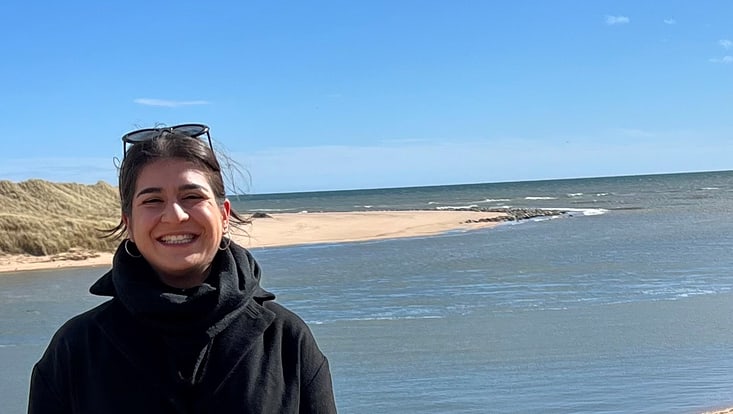MINGZ Funded Research Stay Abroad: Eda in Scotland
11. November 2025

Foto: UHH/Dönmez
The MIN Graduate Center supports doctoral researchers by travel grants for conferences and research stays. The experiences on these trips are diverse and very interesting. Here is a report by Eda Dönmez who traveled to Aberdeen & Glasgow, Scotland to study and collect samples for her research on marine mammals:
Thanks to the MINGZ funding I got to stay for a short research stay at the University of Aberdeen and the University of Glasgow. In Aberdeen, I learned how to analyse metabolomics data and to integrate them with other omics data for my project that focuses on adaptations in harbour porpoises. Additionally, I spent a few days at the University of Glasgow, where I secured important and valuable samples of deep-diving whales which are crucial for a diving adaptation project.
Preparation & Organization
While I did not need a visa or ETA for the UK, I had multiple zoom meetings and exchanged many emails, starting well in advance of the trip, with my collaborators to prepare the stay and clarify what we want to achieve and what is feasible. The accommodation was self-organised and to get around I either relied on the public transport or walked, as both cities are not that widespread and my accommodations were central. Once in Aberdeen, we spend the first day planning what we want to work on each week and I got shown around the facilities and general campus area.
Training and Networking in Aberdeen
Since I was mostly doingdata analysis and visualisations, it was great that I had a desk and laptop at the PhD office for the time being. The exchange with the other PhD students was always helpful and it was interesting to hear about their experiences. We also had a lab meeting for which the lab members and me prepared a project presentation. It was very insightful to hear about the different marine mammal science projects, which I will definitely follow up with. Most of the weeks in Aberdeen were spent on how to use the program “R” and various tools within it, as well as different web applications to analyse and visualise metabolomic and lipidomic data. I took a lot of knowledge and newfound skills in “R” back with me and am very happy with how the analysis and graphs turned out, as these are integral for my doctoral thesis
and publication. On the last day, we enjoyed a sunny drive up to the seal beach in Newburgh with other lab members which was very nice and entertaining.
Collecting Samples in Glasgow
I then drove down to Glasgow for five days to organise the whale samples and talk about other cooperation possibilities. After an introduction meeting, we subsampled the archival tissues in the lab and prepared them for the transport. I also got some insights into the work of the stranding network and a few of their projects and helped with the inventory of citizen science samples. Since there are a lot of remote strandings, help from engaged citizens is necessary to collect samples for future research and conservation efforts. During the stay in Glasgow, I also got to meet other scientists and students from various biology fields, some of which are doing very similar work to mine,
which was great and inspiring!
Free Time & Closing Thoughts
During the free time in Scotland, I explored the famous Scottish nature and went hiking along the North Sea coast where I was lucky enough to spot some dolphins and visited Edinburgh for a day. Also, most museums are free admission in Scotland, so I emerged myself in Scottish history, art and maritime lifestyle.
For me, the research stay was a success as I accomplished the goals set for the research stay, learned important data analysis skills for my PhD and met great (future) collaborators. For students planning a research trip abroad, I would suggest to formulate clear goals and aims and to be realistic and concise in time planning and can only recommend trying out for the MINGZ funding!
